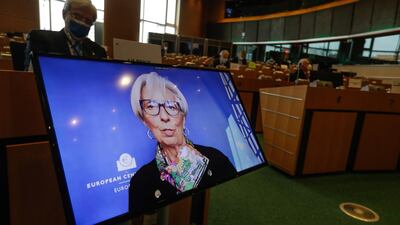European Central Bank chief Christine Lagarde said the lender might need time for its enhanced bond-buying programme to take effect, as the eurozone remains “surrounded by uncertainty”.
The ECB pledged last week to increase the pace of government debt purchases in the coming months to help soothe investor concerns by containing rising bond yields that threaten to derail the region's economic recovery.
However, Ms Lagarde said on Thursday that it would take time before the effects show up in the weekly bond-buying figures.
"While records of our weekly purchases will continue to be distorted by short-term noisy factors – such as occasionally lumpy redemptions – the step-up in the run-rate of our programme will become visible when ascertained over longer time intervals," Ms Lagarde told delegates attending the European Parliament's committee on economic and monetary affairs.
Ms Lagarde was speaking on the one-year anniversary of the launch of the pandemic emergency purchase programme, which now stands at €1.85 trillion ($2.21tn) following a €500bn boost in December.
The programme is due to run until March 2022, as the ECB continues to prop up the eurozone economy with the lender promising that purchases under the scheme will be “significantly higher” in the next quarter.
While Ms Lagarde said the economic situation “looks much brighter” than it did a year ago with expectations of further improvement over the course of 2021, the economic outlook remains rocky.
“In the short term, the economic outlook for the euro area remains surrounded by uncertainty due to the dynamics of the pandemic and the speed of vaccination campaigns,” Ms Lagarde said.
“The severe impact that the pandemic continues to have on not just the economy, but on all aspects of the lives of many Europeans, does not allow us to “celebrate” the anniversary of the Pepp.”
The eurozone economy is struggling because of slow vaccine distribution, now complicated by the suspension of AstraZeneca’s shot in several member states.
While Ms Lagarde said the rebound in global demand and additional fiscal measures are supporting global and eurozone activity, persistently high Covid-19 infection rates and the associated tightening of containment measures hampers that growth.
”As a result, real gross domestic product is likely to contract again in the first quarter of the year after declining by 0.7 per cent in the fourth quarter of 2020,” she said.
Looking ahead, the vaccination campaigns together with the gradual relaxation of containment measures lead the ECB to expect a “firm rebound in economic activity in the second half of 2021”.
“Over the medium term, we expect the recovery in demand, as containment measures are lifted, to be supported by favourable financing conditions and an expansionary fiscal stance,” Ms Lagarde said.
The ECB expects annual real GDP growth to hit 4 per cent in 2021, 4.1 per cent in 2022 and 2.1 per cent in 2023 – levels similar to its December outlook.
Ms Lagarde urged EU member states to finalise their spending plans in the coming weeks to assist the region’s recovery from the coronavirus pandemic.
The EU's Pepp “should become operational without delay”, Ms Lagarde said.
“By brightening economic prospects for firms and households, fiscal policy would also strengthen the transmission of our monetary policy measures,” she said.
National governments are currently in talks with the European Commission on how to spend the money from the joint fund, and some submission were judged inadequate. Plans are due by the end of next month with funds to be disbursed in the summer.
Ms Lagarde said the purchase of government debt “will be implemented flexibly according to market conditions”.
Market concerns were likely to become more pressing after the US Federal Reserve increased its growth and inflation expectations on Wednesday while indicating there will be no interest rate hikes until 2024.
That pushed up yields on long-term US treasuries, which in turn dragged up eurozone borrowing costs.
Mr Lagarde reiterated the bank's policy message, including its guidance on growth and bond yields.
"If sizeable and persistent, increases in those market interest rates, when left unchecked, may become inconsistent with countering the downward impact of the pandemic on the projected path of inflation," Ms Lagarde said.


